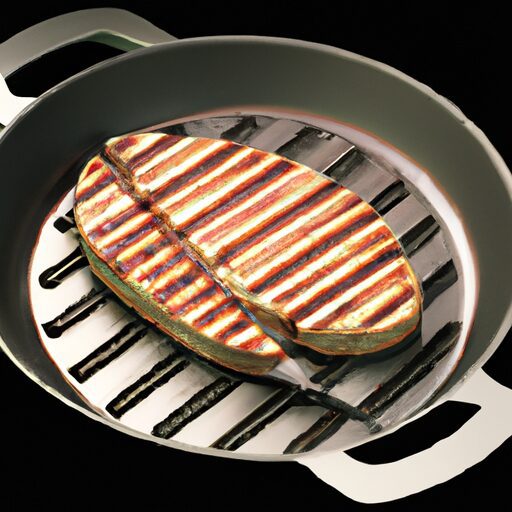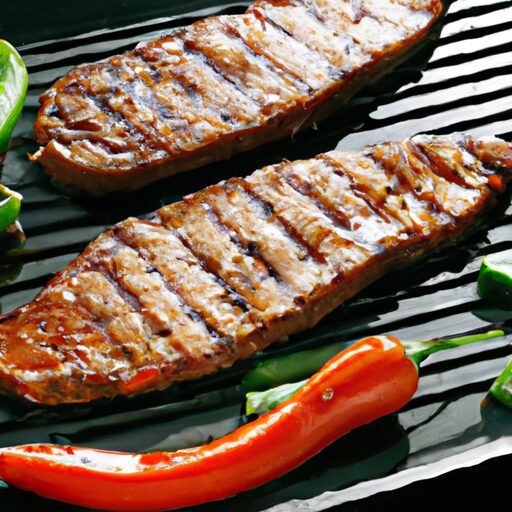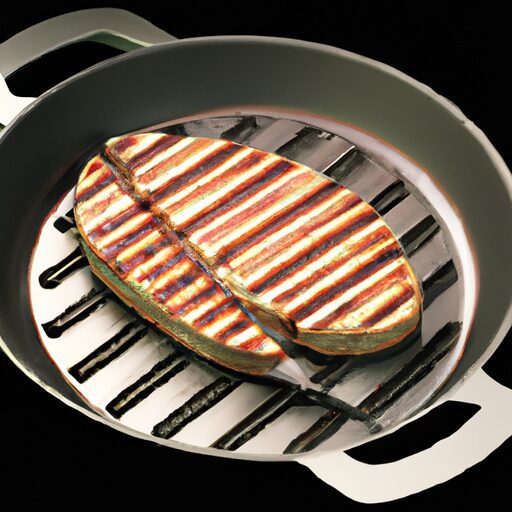
When it comes to grilling, choosing the right pan can make all the difference in creating those perfectly seared and juicy dishes that make our mouths water. But with so many options out there, how do we know which pan is truly the best for the job?
In this article, we’ll explore What Pan Is Best For Grilling? and uncover the secrets to finding the perfect one that will take our grilling game to the next level.
Get ready to elevate your outdoor cooking experience and delight your taste buds with sizzling flavors.
Types of Grill Pans
Grilling is a beloved cooking technique that brings out the best flavors in our food. But what happens when we can’t make it to the great outdoors for a barbecue?
That’s where grill pans come in handy! These versatile kitchen tools allow us to grill our favorite foods indoors, regardless of the weather.
In this article, we will explore the different types of grill pans available on the market, their characteristics, pros, and cons, and provide some tips for choosing the right one for our needs.
Cast Iron Grill Pan
One of the most popular choices for grill pans is the cast iron grill pan. Cast iron is well-known for its ability to heat evenly and retain heat for a long time, making it perfect for searing and achieving those coveted grill marks.
These pans are ideal for cooking thick cuts of meat and vegetables, giving them that irresistibly delicious grilled flavor.
Stainless Steel Grill Pan
For those who prefer a more modern and sleek option, stainless steel grill pans are a fantastic choice. Stainless steel pans offer excellent heat conductivity and are highly durable, making them suitable for high-temperature grilling. The surface is often non-stick, making it easier to clean up after grilling sessions.
Aluminum Grill Pan
If we’re looking for a lightweight option that still delivers excellent grilling results, an aluminum grill pan might be the answer. Aluminum pans heat up quickly and distribute heat evenly, ensuring our food cooks evenly.
They are also lightweight, making them easy to handle and maneuver. However, they may not retain heat as well as other materials.
Ceramic Grill Pan
For those who are health-conscious, a ceramic grill pan is a great option. Ceramic pans are known for their non-toxic properties, as they are made from natural materials.
These pans have excellent heat conductivity, ensuring our food cooks evenly. However, they may not retain heat as well as cast iron or stainless steel pans.
Characteristics of Different Grill Pans
When choosing a grill pan, it’s essential to consider its characteristics to ensure it meets our cooking needs. Let’s explore the key characteristics that differentiate grill pans from each other.
Heat Distribution
The ability of a grill pan to distribute heat evenly across the cooking surface is crucial for achieving consistent cooking results. Cast iron and stainless steel pans excel in this area, providing a uniform heat distribution that ensures our food cooks evenly.
Aluminum and ceramic pans also offer good heat distribution, though they may not be as efficient as cast iron or stainless steel.
Heat Retention
Heat retention is another important characteristic to consider. A grill pan that can retain heat effectively allows for a more controlled cooking process. Cast iron and stainless steel pans excel in heat retention, allowing us to achieve optimal cooking results.
Aluminum pans also have decent heat retention, but they may not be as effective as cast iron or stainless steel pans. Ceramic pans tend to have lower heat retention capabilities.
Durability
Durability is a crucial factor when investing in a grill pan. A durable pan will last for years, ensuring we get the most out of our purchase. Cast iron and stainless steel pans are known for their exceptional durability, often lasting for generations with proper care.
Aluminum pans can be durable, but they may be prone to warping or scratching over time. Ceramic pans are generally less durable and may chip or crack if mishandled.
Non-Stick Coating


Having a non-stick surface on a grill pan can make our cooking experience much more enjoyable and help with the cleanup process. While cast iron and stainless steel pans often lack a non-stick coating, they naturally develop a seasoned, non-stick surface over time with proper care. Aluminum and ceramic pans often incorporate a non-stick coating, making them easier to clean.
Ease of Cleaning
Cleaning up after a delicious grilled meal should be quick and effortless. While cast iron pans require some special cleaning and maintenance to preserve their seasoning, stainless steel, aluminum, and ceramic pans are generally easier to clean.
Non-stick coatings on aluminum and ceramic pans allow for food to be easily released, reducing the need for scrubbing.
Pros and Cons of Each Grill Pan
To further help us decide which grill pan is best for our needs, let’s examine the pros and cons of each type.
Cast Iron Grill Pans
Pros:
- Excellent heat distribution and retention.
- Naturally non-stick surface with proper care and seasoning.
- Highly durable and long-lasting.
Cons:
- Heavier than other types of grill pans.
- Requires special cleaning and maintenance to preserve seasoning.
- Longer preheating time compared to other pans.
Stainless Steel Grill Pans
Pros:
- Excellent heat conductivity.
- Durable and long-lasting.
- Often non-stick surfaces can be seasoned with oil.
Cons:
- May not provide as pronounced grill marks as cast iron pans.
- Food may stick to the surface if not properly oiled or seasoned.
- Can be more expensive than other types of grill pans.
Aluminum Grill Pans
Pros:
- Lightweight and easy to maneuver.
- Quick and even heat distribution.
- Often incorporates a non-stick coating for easier cleaning.
Cons:
- May not retain heat as well as other materials.
- Prone to warping or scratching over time.
- Pan may need frequent seasoning to maintain non-stick properties.
Ceramic Grill Pans
Pros:
- Non-toxic and environmentally friendly.
- Excellent heat conductivity.
- Often incorporates a non-stick coating for easier cleaning.
Cons:
- Lower heat retention compared to materials like cast iron or stainless steel.
- May chip or crack if mishandled.
- Slightly more expensive than other types of grill pans.
Comparison of Different Grill Pans
Now that we have explored the characteristics, pros, and cons of different grill pans, let’s compare them in terms of specific factors that may influence our decision-making process.
Heat Conductivity
In terms of heat conductivity, cast iron and stainless steel pans excel, offering excellent and consistent heat distribution. Aluminum and ceramic pans also offer good heat conductivity, though they may not be as efficient as cast iron or stainless steel.
Weight
If ease of handling is a priority for us, aluminum grill pans are an excellent choice due to their lightweight nature. Cast iron and stainless steel pans are considerably heavier, making them less ideal for those who have difficulty maneuvering heavier cookware.
Maintenance
When it comes to maintenance, cast iron pans require some special care and attention to preserve their seasoning. Stainless steel, aluminum, and ceramic pans often have a non-stick coating or develop a non-stick surface naturally, making them easier to clean and maintain.
Price
In terms of price, aluminum and ceramic pans tend to be more affordable options compared to cast iron and stainless steel pans, which can be more expensive. However, it’s important to consider the durability and long-term value of the pans when evaluating their price.
Choosing the Right Grill Pan for Your Needs


Now that we have examined the different types of grill pans and their characteristics, how do we choose the right one for our specific needs? Here are some factors to consider:
Type of Grill
Consider the type of grill you want to replicate indoors. If you enjoy the traditional, rustic grilling experience with pronounced grill marks, a cast iron grill pan might be the best choice. If you prefer a more modern and sleek appearance, a stainless steel pan might be more suitable.
Type of Food
Think about the type of food you plan to grill most frequently. If you primarily cook thick cuts of meat or vegetables that require longer cooking times, a grill pan with excellent heat retention like cast iron or stainless steel would be ideal. If you typically cook lighter foods that cook quickly, an aluminum or ceramic grill pan might be a better fit.
Cooking Preferences
Consider your personal cooking preferences. If you enjoy the process of seasoning and maintaining a pan’s surface, a cast iron grill pan might be the right choice for you.
If you prefer a pan that requires minimal maintenance and is easier to clean, a stainless steel, aluminum, or ceramic grill pan would be more suitable.
Budget
Lastly, consider your budget. While cast iron and stainless steel pans may come with a higher price tag, they often offer exceptional durability and long-term value. If budget is a concern, aluminum and ceramic pans may be more affordable options that still deliver great grilling results.
Additional Tips for Grilling with a Grill Pan
To make the most of our grill pan and ensure delicious results, here are some additional tips for grilling with a grill pan:
Preheating the Pan
Preheating the grill pan is crucial to achieve those beautiful sear marks and ensure even cooking. Allow the pan to heat up for a few minutes over medium-high heat before adding the food. This will help prevent sticking and ensure a flavorful sear.
Oil or Marinade
To prevent food from sticking and add extra flavor, lightly oil the grill pan or marinate the food before grilling. Use a high smoke point oil like vegetable or canola oil, or experiment with different marinades to enhance the taste of your grilled dishes.
Proper Grilling Techniques
When grilling with a grill pan, remember to avoid overcrowding the surface. Overcrowding can prevent even cooking and hinder the development of grill marks. Allow space between the food items to ensure they cook thoroughly and achieve that unmistakable grilled texture.
Conclusion
Grill pans provide a fantastic indoor grilling experience, allowing us to enjoy our favorite grilled foods regardless of the weather. By understanding the types of grill pans available, their characteristics, pros, and cons, we can choose the right pan for our needs.
Cast iron, stainless steel, aluminum, and ceramic grill pans all offer unique benefits, and it’s important to consider factors like heat distribution, heat retention, durability, non-stick coating, and ease of cleaning when making a decision.
Whether we prefer traditional grill marks, sleek appearances, lightweight handling, or low-maintenance options, there is a perfect grill pan out there for each of us. So fire up the stove, grab your favorite grill pan, and get ready to enjoy mouthwatering grilled dishes in the comfort of your own kitchen!
Is It Worth Buying A Griddle Pan?
Ultimate Guide: Top 8 BBQ Grilling Tool Sets 2023 – Reviews & Recommendations







